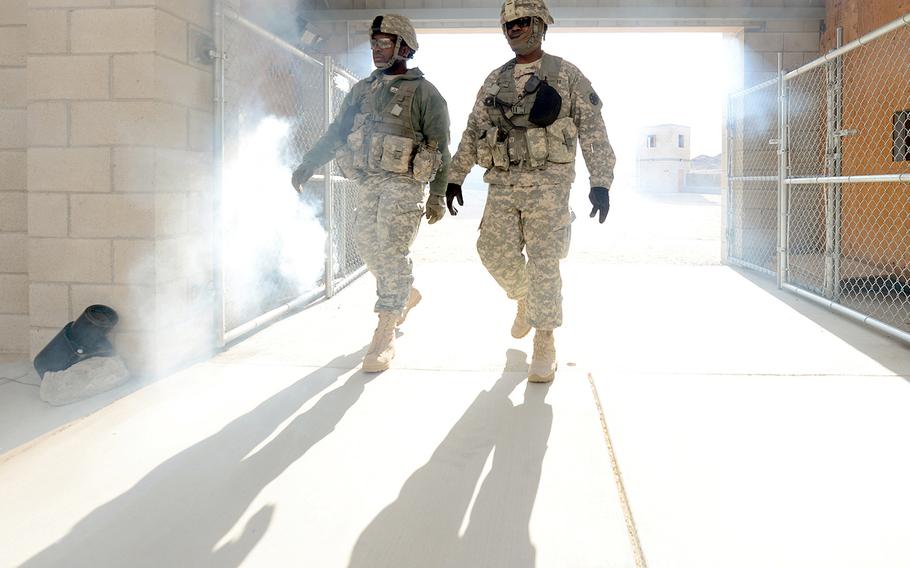Europe
GAO questions keeping AFRICOM in Germany
Stars and Stripes September 10, 2013

Pfc. Damien Davis, left, and Staff Sgt. James Bates, both of the Operations Group at the National Training Center in Fort Irwin, Calif., walk through a entryway obscured by smoke, Feb. 20, 2013. Their group is documenting the 2nd Brigade Combat Team, 1st Infantry Division from Fort Riley, Kansas as they train at NTC as the first brigade to be aligned with AFRICOM. (EJ Hersom/U.S. Army)
STUTTGART, Germany — Relocating U.S. Africa Command to the United States would save the government about $65 million annually and create thousands of new stateside jobs, according to a government report that questions the wisdom of a Pentagon plan to keep the command in Germany.
Earlier this year, the Defense Department opted to keep AFRICOM in Stuttgart following an internal review that examined the costs and benefits of operating in Europe versus relocating to the U.S.
Then AFRICOM chief Gen. Carter Ham and DOD concluded that the benefits of Germany’s proximity to Africa outweighed the costs of the location. However, the Government Accountability Office now argues that DOD’s analysis failed to fully explain the operational benefits of staying in Germany and didn’t balance those factors against the multimillion-dollar cost saving advantages of relocating to the U.S.
“Until the costs and benefits of maintaining AFRICOM in Germany are specified and weighed against the costs and benefits of relocating the command, the department may be missing an opportunity to accomplish its missions successfully at a lower cost,” the GAO reported on Monday.
Although a 2012 study by DOD determined that a move to the U.S. would provide annual savings of roughly $65 million, create an additional 4,500 U.S. jobs and inject about $400 million into the local economy, it is unclear how those factors weighed into DOD’s decision to stay in Stuttgart, according to the GAO. The majority of savings comes from reductions in housing and cost of living allowances, which add up to about $80 million for AFRICOM, according to GAO. Those costs would range from $19 million to $25 million in the U.S.
Meanwhile, the top factors for DOD in its 2013 decision to keep AFRICOM in Stuttgart was access to its area of responsibility and to Europe-based service components.
“However, little support exists showing how the factors were weighted relative to each other,” the GAO stated. “Moreover, the study describes how a small, forward-deployed headquarters element such as the ones employed by other U.S.-based combatant commands might mitigate operational concerns, but the study is silent about why this mitigation plan was not deemed a satisfactory option.”
In addition, about 70 percent of AFRICOM staff travels infrequently. “As a result, these staff could be relocated in the United States without negative effects,” the GAO stated. “This is because the AFRICOM staff includes many support personnel — accountants, personnel specialists, information technology experts, and planners, among other staff — who do their jobs primarily at the headquarters.”
The GAO’s review is the latest chapter in a seemingly endless saga for AFRICOM, which has been plagued by repeated questions about the location of its headquarters since it was launched in 2007. Many have argued that AFRICOM should have been located in Africa, but there was too much resistance from African countries.
There also were concerns about the additional costs of locating on the continent, which also would have involved establishing schools and basing infrastructure for military personnel and their families.
However, over the years there have been calls from lawmakers to move AFRICOM to the U.S. Politicians from Virginia, Florida, South Carolina and Georgia, eager for an economic boost, are among those who have been pushing for AFRICOM to set up shop in their home states.
The GAO review also comes on the heels of reports that DOD is considering a sweeping overhaul of its combatant command structure, including the possibility that AFRICOM could be merged back into European Command, which had responsibility for most of Africa prior to AFRICOM’s becoming a separate command.
According to the GAO, the Defense Department also considered such a merger in 2011, but dismissed the idea at that time.
In its response to the report, DOD stated that it will consider a “wide range of options” to meet the requirements of the Budget Control Act, which resulted in the so-called sequestration — long-term budget cuts.
“If any of those options require additional analysis of the location of AFRICOM headquarters, the Department will conduct a comprehensive and well-documented analysis,” DOD responded.
The GAO report said DOD should conduct a new study to more thoroughly probe the operational and cost-saving benefits of alternative locations for AFRICOM.
“These options should include placing some AFRICOM headquarters personnel in forward locations, while moving others to the United States,” the report recommended.